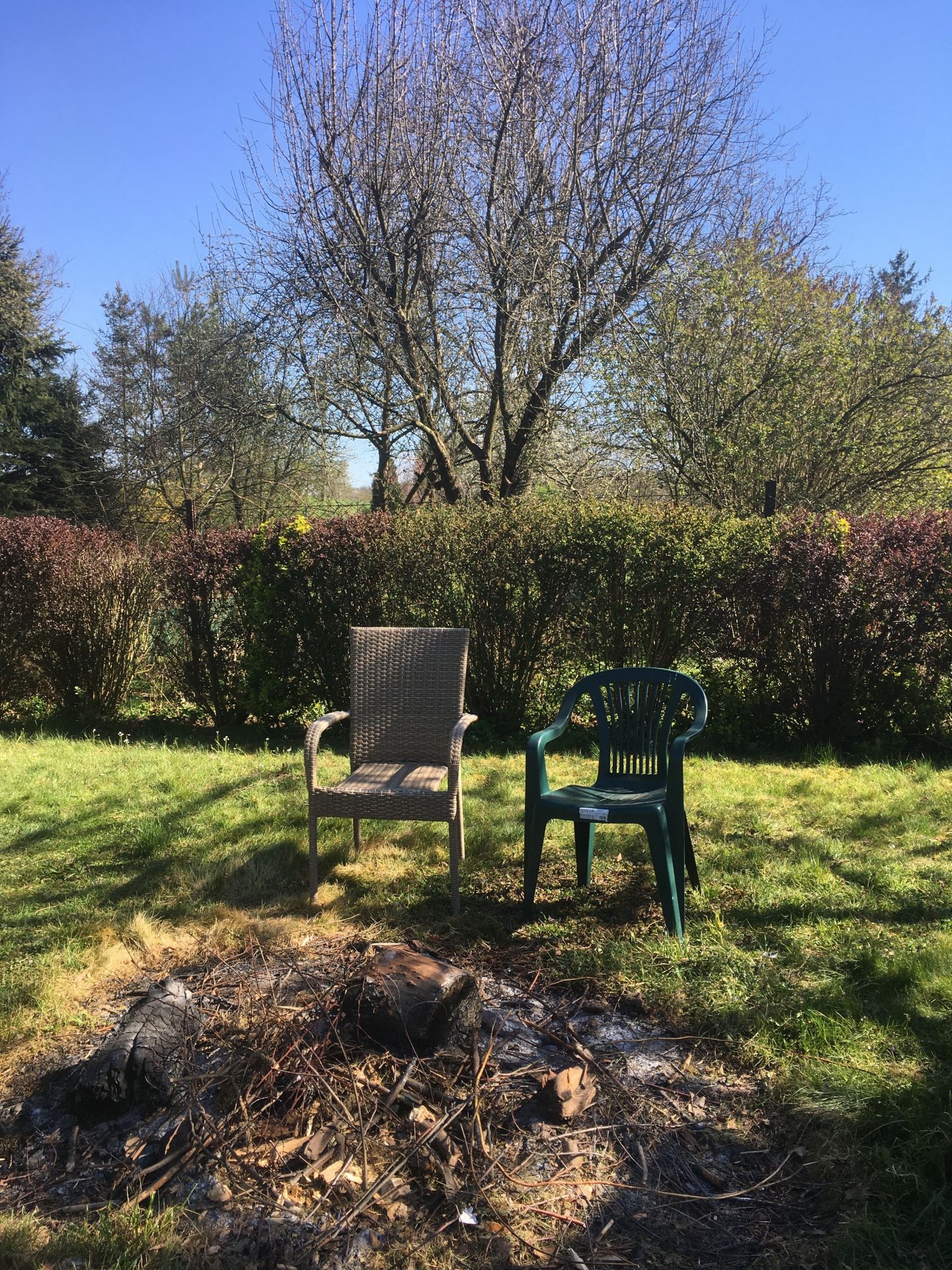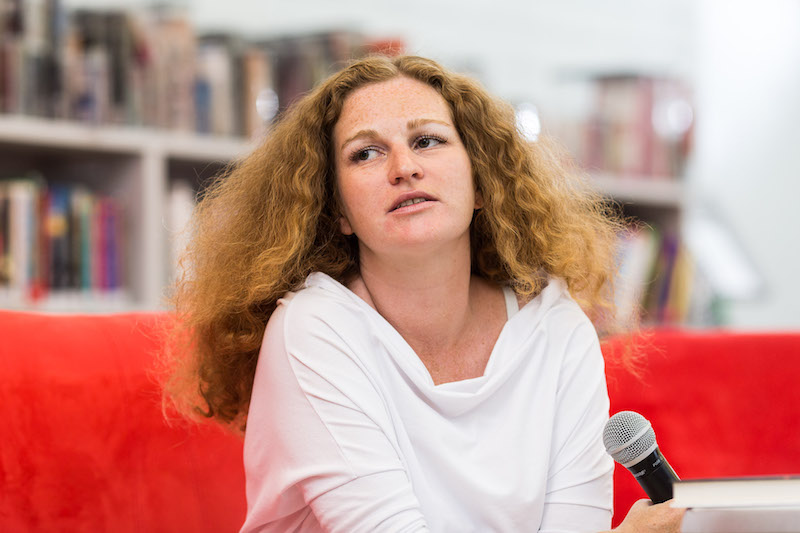Zwracam się z uprzejmą prośbą
Kiedyś V. przylatywała do nas co pół roku, przebierała się w kolorowe suknie, wychodziła palić i czytać do zarośniętego ogrodu, zbierała jabłka, opowiadała irytująco długie historie, coś mieszała na patelni, znów paliła, śpiewała wierszyki własnego autorstwa. W pandemii ciągle mówi o „nowym zamkniętym świecie”. Ja w pandemii latam do Włoch, Niemiec i Francji, a ona nie przestaje mówić o swoim zamknięciu: ma paszport kraju spoza UE.
Szanowni Państwo! Mieszkająca na stałe w Kijowie V. jest osobą chorą i samotną… trzy dekady temu była czynnie zaangażowana w obalenie komunizmu z ZSSR, a także przyczyniła się to tworzenia nowej, demokratycznej… jesteśmy jedyną rodziną V, a przecież nikt nie jest samotną wyspą… Od wielu miesięcy V. nie może wjechać do Polski z powodu obostrzeń epidemiologicznych… Jej lekarz psychiatra uważa, iż mimo leczenia antydepresantami najlepszym lekarstwem byłoby dla V ….
Do Straży Granicznej piszę długie, rzewne, czasami nazbyt poetyckie listy. Gdyby była moją córką, mogłaby przyjechać. Gdyby miała Kartę Polaka, też. Gdyby tu studiowała … Gdyby tu pracowała …
Opierając się na zapisie z obowiązujących aktualnie zasad wjazdu do Polski: „W szczególnie uzasadnionych przypadkach, nieuwzględnionych powyżej, komendant placówki Straży Granicznej może zezwolić… zwracam się więc z uprzejmą prośbą …
…o to, by panowie strzegący polskiej granicy pozwolili V. ponownie robić zdjęcia śladom jeży w naszym ogrodzie – ułoży na ich temat rymowanki, które potem będzie nazbyt często powtarzać. Chlusnąć wieczorem polskiej wódki smakowej. Opowiedzieć na żywo o swoim chorowaniu na COVID, gdy wśród wysokiej gorączki majaczyła o tym, że miesza na patelni fioletowe danie składające się z poetyckich strof. To jej mieszanie miało uratować trzech pisarzy: jeden jawił się jako krucha kobieca sylwetka, drugi jako cienkie linie na jej dłoni, trzeci jako krwawy obłok za jej plecami.
…o pozwolenie na przekroczenie granicy na zasadzie wyjątku …jesteśmy jedyną rodziną V., to po niej mamy zamiłowanie do kolorowych strojów i irytujących zabaw słownych.
Ich wende mich an Sie mit der herzlichen Bitte ...
Früher kam V. zweimal im Jahr zu uns. Sie zog sich bunte Kleider an, ging nach draußen in den üppigen Garten, um zu rauchen und zu lesen, sie sammelte Äpfel, erzählte seltsam lange Geschichten, mischte irgendetwas in der Pfanne zusammen, dann rauchte sie wieder und sang selbst gedichtete Lieder. In der Pandemie spricht sie nun dauernd von der „verschlossenen neuen Welt“. Ich fliege in der Pandemie nach Italien, Deutschland und Frankreich, während sie unaufhörlich über ihr Eingeschlossensein spricht: Sie hat einen Pass von außerhalb der EU.
Sehr geehrte Damen und Herren!
V., die ihren ständigen Wohnsitz in Kiew hat, ist krank und einsam (…) Vor drei Jahrzehnten war sie aktiv am Sturz des Kommunismus in der UdSSR beteiligt, zudem leistete sie einen Beitrag zur Schaffung eines neuen, demokratischen (…) Wir sind die einzige Familie von V., und schließlich ist keiner eine Insel (…) Seit vielen Monaten kann V. aufgrund der pandemiebedingten Einschränkungen nicht nach Polen einreisen (…) Ihr Psychiater ist der Meinung, trotz der Behandlung mit Antidepressiva sei es die beste Medizin für V., wenn sie (…)
Ich schreibe lange, rührselige, manchmal etwas zu poetische Briefe. Wäre sie meine Tochter, könnte sie einreisen. Hätte sie eine Karta Polaka, auch. Würde sie hier studieren … Würde sie hier arbeiten …
Bezugnehmend auf die derzeit geltenden Regeln zur Einreise nach Polen („In besonders begründeten Fällen kann der Kommandant des örtlichen Grenzschutzes die Erlaubnis erteilen …“), wende ich mich an Sie mit der herzlichen Bitte …
… dass Sie, meine Herren, die Sie die polnische Grenze bewachen, es V. erlauben, wieder Fotos von den Igelspuren in unserem Garten zu machen, darüber Reime zu dichten und sie wieder und wieder aufzusagen. Abends polnischen aromatisierten Wodka zu schlürfen. Von ihrer COVID-Erkrankung zu erzählen, als sie im Fieberrausch davon halluzinierte, wie sie in einer Pfanne ein lilafarbenes Gericht aus Gedichtstrophen zubereitete, und wenn sie sie miteinander vermischte, ließen sich gleich drei Schreibende retten: Eine erschien in der Gestalt einer zarten, weiblichen Silhouette, ein zweiter als dünne Linien auf ihrer Handfläche, ein dritter als blutige Wolke hinter ihrem Rücken.
… dass Sie V. die Erlaubnis erteilen, im Rahmen einer Ausnahmeregelung nach Polen einzureisen (…) Wir sind die einzige Familie von V. – sie ist es, von der wir unsere Neigung zu bunter Kleidung und seltsamen Wortspielen haben.
Übersetzung: Simone Falk
I’m appealing to you with a polite request …
In the past, V. would fly over to visit us every six months, dress up in colourful frocks, go outside to smoke and to read in our overgrown garden, pick apples, tell tediously long stories, whip something up in a frying pan, have another smoke, and sing ditties of her own invention. During the pandemic there’s endless talk about a “new, confined world”. During the pandemic I have flown to Italy, Germany and France, but she has never stopped going on about her confinement ¾ and that’s because she holds a non-EU passport.
Dear Sirs,
V., a permanent resident of Kiev, is sick and lonely… thirty years ago she was actively involved in bringing down communism in the USSR, and also contributed to the creation of the new, democratic… we are V.’s only family, and no man is an island… For months V. has been unable to enter Poland because of pandemic-related restrictions… Her psychiatrist believes that rather than just anti-depressants the best remedy for V. would be…
I’m constantly writing long, wistful, unduly poetic letters to the Border Guards. If she were my daughter, she could come here. If she had a Polish Card, officially confirming her Polish roots, she could come too. If she were studying here… If she were working here…
Based on the rules currently in force for entry to Poland: “In well-justified cases not listed above, the officer in charge of the Border Guard post may give permission”… and so I’m appealing to you with a polite request…
…for the gentlemen guarding the Polish border to allow V. to photograph evidence of hedgehogs in our garden again, compose rhymes about them, and then repeat them far too often, swill flavoured Polish vodka every evening, give us a vivid account of how she fell sick with COVID and in a high fever hallucinated that she was mixing a purple dish made of pieces of poetry in her frying pan ¾ this mixture of hers was going to save three writers: one appeared as a fragile female silhouette, the second as some thin lines on the palm of her hand, and the third as a blood-red cloud behind her.
…for permission to cross the border as an exception… we are V.’s only family, and it’s from her that we’ve inherited our love of brightly coloured clothes and infuriating word games.
Translation: Antonia Lloyd-Jones
Teilen












